Animal Radio "Hero People"
Riina Cook, Romeo's Bucket List
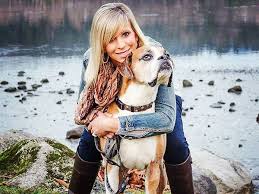 Our Hero Person this week is Riina Cooke. When she discovered her dog had a terminal illness and only months to live, she created a bucket list of stuff to do with "Romeo" before he passed. She shares how the idea originated and some of the fun things she did with her dog in his last moments.
Our Hero Person this week is Riina Cooke. When she discovered her dog had a terminal illness and only months to live, she created a bucket list of stuff to do with "Romeo" before he passed. She shares how the idea originated and some of the fun things she did with her dog in his last moments.
When Riina Cooke of British Columbia found out that her dog and best friend, Romeo, a 9-year-old boxer, had untreatable bone cancer in his back leg and had only weeks to live, she was devastated. Unfortunately Romeo was not a candidate for amputation, as he had severe arthritis in his other knee and spondylitis in his spine. Even if he could have the amputation, it might have only given him an extra month or so. After grieving for a while, Riina had an idea. She decided, "Don't count the days, make the days count."
In the beginning, Riina was very upset and depressed. One day, Romeo just looked at her and seemed to ask her what she was doing. He didn't know he had cancer. He just knew he had a sore leg, but didn't know that he was dying. However, Romeo was a very emotional dog and would get upset when he saw Riina upset. Riina knew then that she just couldn't lie there and do nothing. She started brainstorming and decided to make the last few days of Romeo's life, however long that was, positive and happy.
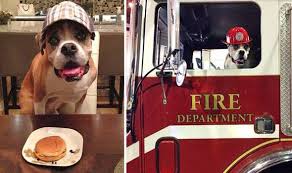 In making the bucket list, Riina knew that Romeo loved to eat. However, he always had stomach issues and his diet was limited. Not any more! Riina decided to let Romeo have anything he liked. This included a filet mignon dinner and a cheeseburger from McDonalds.
In making the bucket list, Riina knew that Romeo loved to eat. However, he always had stomach issues and his diet was limited. Not any more! Riina decided to let Romeo have anything he liked. This included a filet mignon dinner and a cheeseburger from McDonalds.
Another thing Romeo liked was a siren. Since her dad was a retired fireman, she was able to arrange a ride not only in a fire truck but also in a police car.
Riina tells anyone who is going though this with their own pet to make their last days count. Don't mope around and be upset, you will have all the time in the world to do that after your pet has gone. Our pets are sensitive and will pick up on our emotions. They don't know they're dying and to see us upset will only make them upset. Just make it a happy experience.
Riina has heard from a lot of people who are following in her footsteps and doing their own bucket lists for their dogs. This is Romeo's legacy and had made her grieving process a little bit easier and has made her very happy that Romeo's living on, touching other people's lives and helping them cope with their own pet's death!
Riina was able to have Romeo with her four months after the original diagnosis of four weeks. Read more about Romeo and other stories he inspired at Romeo's Facebook page.

ANIMAL RADIO'S HERO PEOPLE is brought to you by FetchID, Pet Microchip Registration - So They Come Back.
Where Animals Go To Retire
Ellie Laks, My Gentle Barn
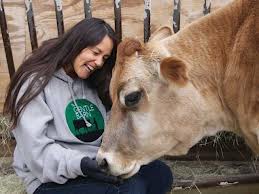 Ellie Laks spends her days caring for a menagerie of animals that were abandoned or neglected. From cows to kitties, her property is home to over a hundred animals that will live their life out at The Gentle Barn.
Ellie Laks spends her days caring for a menagerie of animals that were abandoned or neglected. From cows to kitties, her property is home to over a hundred animals that will live their life out at The Gentle Barn.
Ellie has always had an intensely strong connection to the animal kingdom. From the wounded birds she would care for as a little girl to the thousands of farm animals she has rescued as an adult, Ellie finds a comfort and peace with animals unlike anything she has ever felt with humans.
In 1999, Ellie founded The Gentle Barn in Southern California, a nonprofit organization that rescues, rehabilitates and offers sanctuary to abused animals. These animals are too old, too sick, too lame or too scared to be adopted by other rescues. The Gentle Barn has rescued everything from cows, horses, sheep, pigs, goats, chickens and turkeys to peacocks, llamas, dogs, cats, donkeys and parrots. Ellie says about the only thing they don't have is lions and tigers! The Gentle Barn currently houses 170 animals.
Because these animals are ones that no one else wants, The Gentle Barn's specialty is not so much rehoming (they do that as well) but in rehabilitation. Some of these animals need to learn how to walk, how to be happy, healthy and comfortable. They then get to live out the remainder of their lives at The Gentle Barn.
Once the animas are happy and healthy, they then help humans with the same stories of abuse and neglect. It is a circle of healing. The Gentle Barn heals the animals and then the animals the people.
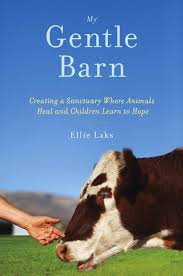 The Gentle Barn currently runs a 10-month program from September to June. They work with at-risk inner city and special needs kids. They also work with war veterans, senior centers, domestic violence shelters and terminally ill patients.
The Gentle Barn currently runs a 10-month program from September to June. They work with at-risk inner city and special needs kids. They also work with war veterans, senior centers, domestic violence shelters and terminally ill patients.
A lot of the kids that they work with do not respond to traditional therapy, because they think of themselves as bad, unwanted and unlovable. But working with the animals give them positive mirrors and gives them a chance to shine. It lets them know they have value and worth and that someone out there likes them, even if it is a horse. Sometimes this is all it takes to change a life.
Since its inception, The Gentle Barn has rescued and been home to thousands of animals (including cows who give hugs, pigs who befriend chickens and horses who have forged deep bonds with special-needs children). The Gentle Barn has also hosted more than 400,000 visitors and has become an extraordinary nonprofit that brings together a volunteer staff of community members and at-risk teens to rehabilitate abandoned and abused animals. As Ellie teaches the volunteers to care for the animals, they learn a new language of healing that works wonders on the humans as much as it does on the animals.
You can learn more about Ellie Laks and The Gentle Barn in her new book, "My Gentle Barn."
http://www.gentlebarn.org
Loss Prevention
Ulvid Osis, FetchID
 While microchips are a great form of identification, Ulvid Osis created a pet registration system that works in tandem with microchips to help owners find missing animals using a Google search. He'll explain how FetchID is peace of mind.
While microchips are a great form of identification, Ulvid Osis created a pet registration system that works in tandem with microchips to help owners find missing animals using a Google search. He'll explain how FetchID is peace of mind.
When you get your dog from a shelter or rescue, chances are they have been microchipped with the organization's information. Some guardians then change this information to their own when they adopt an animal. Unfortunately there are dozens of different services out there, which offer registration and they all have different databases online.
FetchID is a next generation microchip registration and pet recovery service for all brands of microchips. Rescuers can now connect directly with a FetchID registered pet owner through a Google Search and instantly get the guardians contact information. This allows you to call the guardian directly so they can immediately retrieve their pet. The alternative was that you would call an 800 number where they would have to search multiple databases, and if you did find the microchip number, chances are it wasn't even the guardians, but a rescue organization.
 Even pets that are already registered with another company can be registered with FetchID to upgrade their existing registration. You can register any brand of microchip with FetchID. Even if you have an old microchip, one that may be registered to an organization, or one you are not even sure is registered, you can register it with FetchID.
Even pets that are already registered with another company can be registered with FetchID to upgrade their existing registration. You can register any brand of microchip with FetchID. Even if you have an old microchip, one that may be registered to an organization, or one you are not even sure is registered, you can register it with FetchID.
There is no middleman with FetchID. They put people who find animals in direct contact with those who have lost them. This is the quickest way possible – from the rescuer right to the owner.
Registering with FetchID is only a onetime charge of $9.99, which includes the Cloud-Based Pet Search, Lost Pet Alerts, $500 Travel Assistance (for example if your dog is lost while you are away from home) and Customized Lost Pet Flyers.
Because there are no annual fees, pet owners can save $200 over a pet's lifetime.
http://www.fetch-id.com
 The Dogfather's Grooming Tip with Joey Villani
The Dogfather's Grooming Tip with Joey Villani
When Should You Start Using Pest Preventative?
No one likes to use pest control if they don't have to. So when is the best time to start? This all depends on your environment.
Domesticated pets and pests do not go together. Some people will say all animals have fleas and ticks, such as deer and squirrels, along with our own pets. However, we have domesticated our pets and don't what these parasites in our homes and ultimately on us. These parasites can cause disease and infections and in some cases death.
If you live in an area where your pet is constantly coming in contact with fleas and ticks, start your prevention right after that last frost, which is in early spring.
If you are using a topical flea and tick control on your pet, like Frontline, you don't want to apply it right before your dog has been washed or even right after. For example, you don't want to apply these products immediately after your dog has been groomed. These products are meant to act like a wick and will go into your pet's hair shaft, where they will actually sit there and will keep the fleas and ticks off your pet. But after your dog has been freshly bathed and you apply these products, they will immediately get absorbed into their system instead. This will not work as well and your pet is absorbing pesticides that it shouldn't, in a more rapid fashion.
 It's best to wait one to two days after a bath, or two days prior to a bath, before applying any topical. A bath will not wash off the application, because the products are oil based, they will sit down in the hair follicle and will remain.
It's best to wait one to two days after a bath, or two days prior to a bath, before applying any topical. A bath will not wash off the application, because the products are oil based, they will sit down in the hair follicle and will remain.
If you do have an infestation and your pet is filthy dirty, get the parasites off first. You can then bathe the pet in a couple of days. If your pet doesn't have an infestation, it is better to do it on clean skin, than dirty skin, which will work much better.
Animal Radio® News with Tammy Trujillo
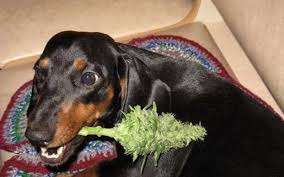 Pot & Pets Don't Mix
Pot & Pets Don't Mix
Here's A Real Sign Of The Times. More and more vets are seeing pets coming in high on marijuana. It's a direct result of the legalization pot. Many people are no longer hiding their marijuana and keeping it out means that pets can get into it. Legalized medical marijuana is not toxic to animals, but it can give them a pretty good upset stomach and have other minor side effects, like making the pet rather lethargic. Vets say you should be more worried if you pet gets into a stash of synthetic marijuana. Several animals have died from eating the synthetic pot and the side effects can be far more serious and last a lot longer.
Autistic Children Benefit From Dogs
We keep on hearing how good pets can be for our health. They're credited with everything from lowering blood pressure to helping relieve anxiety. Now studies are showing that autistic children could benefit from interacting with dogs. Research published recently in the Journal of Pediatric Nursing says many autistic kids are able to connect with a dog in ways they cannot connect with other people and that the dogs provide unconditional and non-judgmental love. The study also showed that a dog could provide a sort-of bridge to help children with autism communicate with others. It turns out that lots of parents of autistic children already know this. The study found that nearly two-thirds of the families that include an autistic child also had a canine family member and 94 percent said that their children had a special bond with their pets.
 Colorado Is The 39th State To Ban Greyhound Racing
Colorado Is The 39th State To Ban Greyhound Racing
The governor of Colorado has signed a law banning greyhound racing. Greyhounds haven't been running in Colorado since 2008, but now it's illegal as well. At its peak, some $250 million dollars was spent on greyhound racing in Colorado in 1999. Popularity fell off and that figure was down to just 15 million by 2008. At least seven states still allow greyhound racing.
Mexico Is Going To The Dogs
Over the past decade, Mexico's middle class has been growing and that has created a new market for all things dog. This includes everything from clothing and accessory boutiques, spas and restaurants that feature doggie snacks. Many of the estimated 40 million Mexicans considered to be middle class are having fewer children than their parents did and, therefore, also have more disposable income. Since 2008, sales of pet-related products in Mexico have grown an average of 13 percent a year, to $2.2 billion last year. But there's a real downside to this too. At the other end of the income scale, owners of purebred dogs are being hit by robbery and kidnapping of animals worth thousands of dollars in some cases.
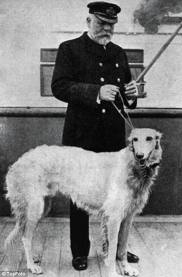 The Dogs Of The Titanic
The Dogs Of The Titanic
It's been 102 years since the Titanic disaster. We've all heard what happened to the passengers aboard the ship that struck an iceberg on its maiden voyage to America and sank. But info is just coming out about the dogs aboard the ship. There were at least 12, but probably many more since most were listed only as cargo in the ship's records. The Titanic had a fantastic kennel for the more well healed dogs and in fact was reportedly planning a dog show for April 15, the day the ship went down. Three of the 12 confirmed dogs survived the shipwreck, all three were small dogs and easy to hide inside a blanket or the coat of the owner who made it into one of the lifeboats.
Pet Obesity Is On The Rise
We've been hearing for years now about the fact that obesity can cause all sorts of health problems in pets just like it can in people. But despite all the info, the Association for Pet Obesity Prevention (APOP) says that the number of obese pets is not going down. The group's annual survey found that nearly 58-percent of cats and 53-percent of dogs are still carrying too much weight. That can result in things like osteoarthritis, type 2 diabetes, heart disease, joint injury, cancer and ultimately cut life expectancy. What to do? APOP is working to develop tools for vets to assess normal weight better and to standardize how much food and exercise different kinds of pets need to stay healthy. An online poll done by APOP found that 42-percent of dog and cat guardians admitted they didn't know what a healthy weight for their pet would look like.

NEWS UPDATE brought to you by Drs. Foster & Smith, affordable pet supplies. Low prices every day, so you save on every order.
 Listen to the entire Podcast of this show (#752)
Listen to the entire Podcast of this show (#752)



 Our Hero Person this week is Riina Cooke. When she discovered her dog had a terminal illness and only months to live, she created a bucket list of stuff to do with "Romeo" before he passed. She shares how the idea originated and some of the fun things she did with her dog in his last moments.
Our Hero Person this week is Riina Cooke. When she discovered her dog had a terminal illness and only months to live, she created a bucket list of stuff to do with "Romeo" before he passed. She shares how the idea originated and some of the fun things she did with her dog in his last moments.
 Ellie Laks spends her days caring for a menagerie of animals that were abandoned or neglected. From cows to kitties, her property is home to over a hundred animals that will live their life out at The Gentle Barn.
Ellie Laks spends her days caring for a menagerie of animals that were abandoned or neglected. From cows to kitties, her property is home to over a hundred animals that will live their life out at The Gentle Barn. The Gentle Barn currently runs a 10-month program from September to June. They work with at-risk inner city and special needs kids. They also work with war veterans, senior centers, domestic violence shelters and terminally ill patients.
The Gentle Barn currently runs a 10-month program from September to June. They work with at-risk inner city and special needs kids. They also work with war veterans, senior centers, domestic violence shelters and terminally ill patients. Even pets that are already registered with another company can be registered with FetchID to upgrade their existing registration. You can register any brand of microchip with FetchID. Even if you have an old microchip, one that may be registered to an organization, or one you are not even sure is registered, you can register it with FetchID.
Even pets that are already registered with another company can be registered with FetchID to upgrade their existing registration. You can register any brand of microchip with FetchID. Even if you have an old microchip, one that may be registered to an organization, or one you are not even sure is registered, you can register it with FetchID. The Dogfather's Grooming Tip with
The Dogfather's Grooming Tip with  Pot & Pets Don't Mix
Pot & Pets Don't Mix
 The Dogs Of The Titanic
The Dogs Of The Titanic
